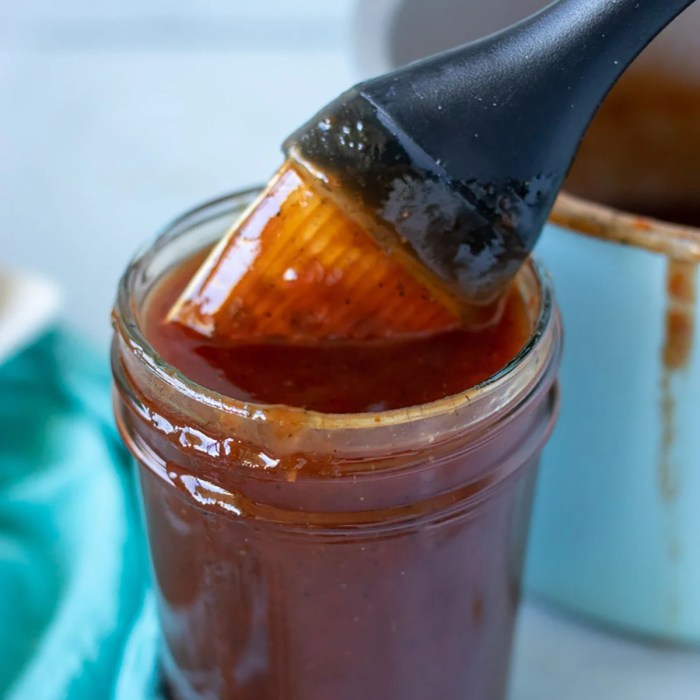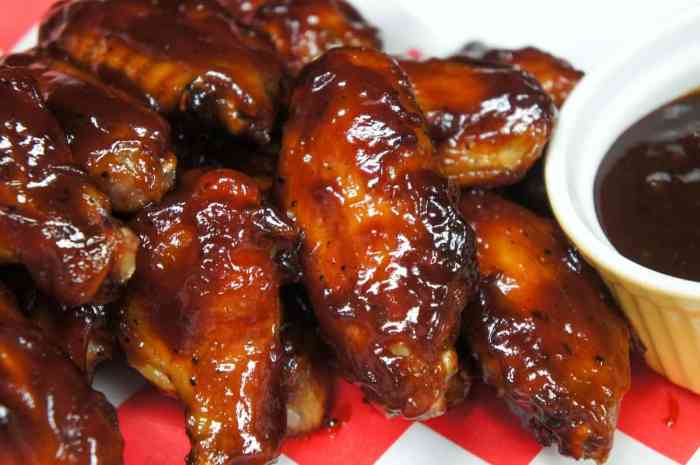Sticky BBQ Sauce Recipe A Guide
Understanding Sticky BBQ Sauce
Sticky bbq sauce recipe – Sticky BBQ sauce is a culinary delight, characterized by its intensely flavorful profile and thick, clinging texture. This sauce, a cornerstone of American cuisine, boasts a rich history of regional variations, each reflecting unique cultural influences and culinary traditions. A good sticky BBQ sauce balances sweetness, acidity, and savory notes, creating a complex flavor that enhances the taste of grilled meats.
A fantastic sticky BBQ sauce recipe hinges on achieving that perfect balance of sweet and smoky. While this sauce is delicious on ribs, you might find yourself exploring other options when considering sauces for steak recipes, such as those detailed on this helpful website: sauces for steak recipes. Returning to our sticky BBQ sauce, remember that a good quality vinegar is key to cutting through the sweetness and adding depth of flavor.
The ideal consistency is thick enough to coat the food generously, yet not so thick as to be difficult to spread.
A Brief History of BBQ Sauce Variations
The origins of BBQ sauce are diverse and debated, but it’s generally accepted that various indigenous populations across the Americas used sauces to enhance the flavor of their grilled meats. European colonization introduced new ingredients and techniques, leading to the development of distinct regional styles. The emergence of commercial production in the 20th century further diversified the landscape of BBQ sauces, leading to the many variations we know today.
Early sauces often relied on simple ingredients like vinegar, pepper, and spices. The evolution of BBQ sauce reflects the diverse culinary influences throughout American history.
Regional Sticky BBQ Sauce Styles
Regional variations in sticky BBQ sauce are numerous, with each style showcasing unique flavor profiles. The Carolina style, for example, often features a vinegar-based sauce with a tangy and peppery bite. Kansas City style tends to be sweeter, with a tomato-based foundation and a balance of smoky and sweet flavors. Memphis style leans towards a dry rub, but when a sauce is used, it often incorporates a tangy vinegar component.
These are just a few examples of the regional diversity within sticky BBQ sauces.
Ingredients and Their Roles
The magic of sticky BBQ sauce lies in the careful balance of its ingredients. Each component plays a crucial role in achieving the desired flavor and texture.
Key Ingredients and Their Functions

Source: persnicketyplates.com
Vinegar provides acidity, balancing the sweetness and adding a tangy depth. Sugar contributes sweetness and helps to thicken the sauce during cooking. Spices such as paprika, chili powder, and black pepper add complexity and heat. Other common ingredients include ketchup, Worcestershire sauce, and molasses, each contributing unique nuances to the overall flavor profile.
Impact of Different Sugars
Different types of sugar impact the texture and flavor of the sauce. Brown sugar adds a deeper, molasses-like flavor and a richer color. Granulated sugar provides a cleaner sweetness. Honey or maple syrup introduce more complex flavor notes and contribute to the sauce’s stickiness. The choice of sugar depends on the desired level of sweetness and flavor complexity.
Types of Vinegars in BBQ Sauce
Apple cider vinegar offers a mellow sweetness, while white vinegar provides a sharper, more acidic taste. Red wine vinegar contributes a fruity undertone. The choice of vinegar impacts the overall acidity and flavor profile of the sauce, affecting the balance of sweet and sour.
Common Ingredients and Substitutes
| Ingredient | Substitute | Ingredient | Substitute |
|---|---|---|---|
| Brown Sugar | Granulated Sugar + Molasses | Apple Cider Vinegar | White Vinegar |
| Ketchup | Tomato Paste + Sugar + Vinegar | Worcestershire Sauce | Soy Sauce + Vinegar |
| Liquid Smoke | Smoked Paprika | Honey | Maple Syrup |
Recipe Variations and Techniques
This section details three unique sticky BBQ sauce recipes, demonstrating how to achieve varying levels of sweetness and spice through ingredient selection and cooking methods.
Recipe 1: Sweet and Smoky BBQ Sauce
- Combine 1 cup ketchup, ½ cup brown sugar, ¼ cup apple cider vinegar, 2 tbsp Worcestershire sauce, 1 tbsp smoked paprika, 1 tsp garlic powder, 1 tsp onion powder, ½ tsp black pepper, and ¼ tsp cayenne pepper in a saucepan.
- Bring to a simmer over medium heat, stirring occasionally.
- Reduce heat to low and simmer for 30 minutes, stirring occasionally, until thickened.
Recipe 2: Tangy Carolina-Style BBQ Sauce
- Whisk together 1 cup apple cider vinegar, ½ cup brown sugar, ¼ cup ketchup, 2 tbsp Dijon mustard, 1 tbsp paprika, 1 tbsp black pepper, 1 tsp garlic powder, and ½ tsp cayenne pepper in a saucepan.
- Bring to a simmer over medium heat, stirring occasionally.
- Reduce heat to low and simmer for 20 minutes, stirring occasionally, until slightly thickened.
Recipe 3: Spicy Kansas City-Style BBQ Sauce
- Combine 1 cup ketchup, ½ cup brown sugar, ¼ cup molasses, ¼ cup apple cider vinegar, 2 tbsp Worcestershire sauce, 1 tbsp chili powder, 1 tbsp smoked paprika, 1 tsp garlic powder, 1 tsp onion powder, and 1 tbsp cayenne pepper in a saucepan.
- Bring to a simmer over medium heat, stirring occasionally.
- Reduce heat to low and simmer for 45 minutes, stirring occasionally, until very thick.
Achieving Different Levels of Stickiness
Simmering time directly impacts the sauce’s thickness and stickiness. Longer simmering times result in a thicker, stickier sauce due to water evaporation. A cornstarch slurry (1 tbsp cornstarch mixed with 2 tbsp cold water) can be added during the last few minutes of simmering for extra thickness.
Flavor Profiles and Pairing Suggestions: Sticky Bbq Sauce Recipe
Each recipe boasts a distinct flavor profile, making it ideal for pairing with specific meats and sides.
Recipe 1: Sweet and Smoky BBQ Sauce
Dominant flavor notes include sweetness from brown sugar, smokiness from smoked paprika, and a hint of heat from cayenne pepper. This sauce pairs well with ribs, pulled pork, and brisket.
- Ribs
- Pulled Pork
- Brisket
- Grilled Chicken
- Coleslaw
Recipe 2: Tangy Carolina-Style BBQ Sauce
This sauce is characterized by its tangy vinegar flavor, balanced by a subtle sweetness and a peppery kick. It complements chicken, pork chops, and even fish.
- Grilled Chicken
- Pork Chops
- Grilled Fish
- Baked Beans
- Potato Salad
Recipe 3: Spicy Kansas City-Style BBQ Sauce
This sauce offers a robust flavor profile with a balance of sweetness, spice, and smokiness. It’s perfect for bold meats that can stand up to its intensity.
- Brisket
- Burgers
- Sausages
- Mac and Cheese
- Corn on the Cob
Visual Presentation and Serving Suggestions
The visual appeal of a sticky BBQ sauce is as important as its taste. A good sticky BBQ sauce should have a rich, glossy sheen, a thick and luscious consistency, and a deep, appealing color.
Ideal Visual Appearance
The color should be deep and rich, reflecting the ingredients used. The texture should be thick and glossy, almost syrupy, clinging to the meat or vegetables. The overall appearance should be inviting and appetizing.
Serving Suggestions

Source: cook2eatwell.com
Serve Recipe 1 in a small bowl alongside the ribs, allowing guests to generously coat each bite. Recipe 2 can be drizzled over grilled chicken, adding a vibrant splash of color and flavor. Recipe 3 is best served as a dipping sauce for burgers or sausages, showcasing its thick, glossy texture.
Storage and Shelf Life
Proper storage is crucial for maintaining the quality and flavor of homemade sticky BBQ sauce. Refrigeration is key to extending its shelf life.
Storage Methods
Store the sauce in airtight containers in the refrigerator. This prevents air exposure and helps maintain its consistency and flavor. Freezing is also an option for longer-term storage.
Shelf Life
Refrigerated BBQ sauce typically lasts for 1-2 weeks. Frozen sauce can be stored for up to 3 months. Always check for signs of spoilage such as mold or unusual odors before consuming.
Impact of Storage Conditions, Sticky bbq sauce recipe
Improper storage can lead to spoilage, affecting the flavor and texture of the sauce. Exposure to air can cause oxidation, leading to a change in color and flavor. Fluctuations in temperature can also impact the sauce’s consistency.
Freezing and Thawing
Freeze the sauce in airtight containers, leaving some headspace for expansion. Thaw the sauce in the refrigerator overnight to prevent separation and maintain its quality. Avoid repeated freezing and thawing cycles.
General Inquiries
Can I use brown sugar instead of granulated sugar?
Yes, brown sugar adds a deeper, molasses-like flavor and a slightly softer texture.
How long can I store homemade sticky BBQ sauce in the refrigerator?
Properly stored in an airtight container, your homemade sauce should last for about 2-3 weeks in the refrigerator.
What happens if I overcook the BBQ sauce?
Overcooking can lead to a thicker, potentially burnt sauce. It might also lose some of its vibrant flavor.
Can I freeze sticky BBQ sauce?
Yes, freezing is a great way to extend the shelf life. Allow it to thaw completely in the refrigerator before using.













